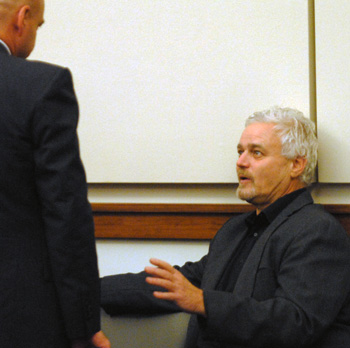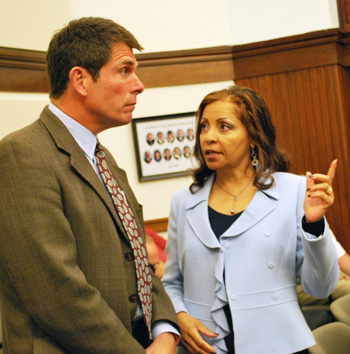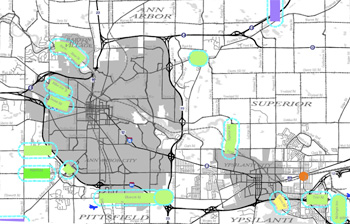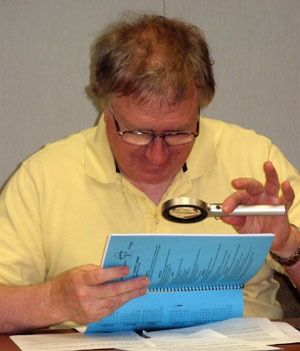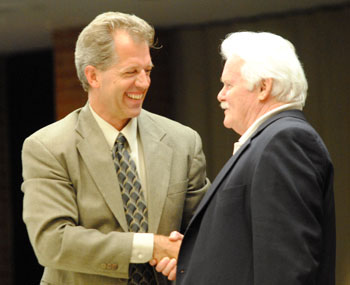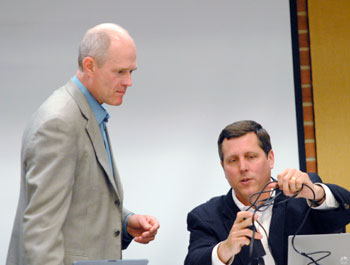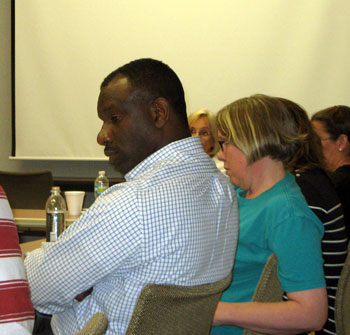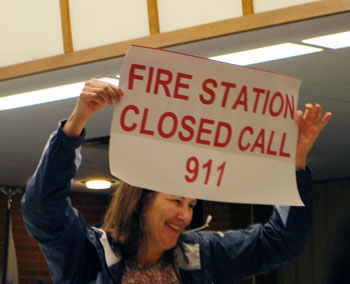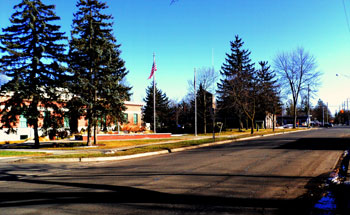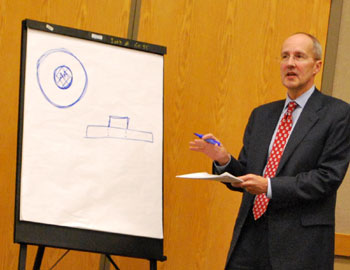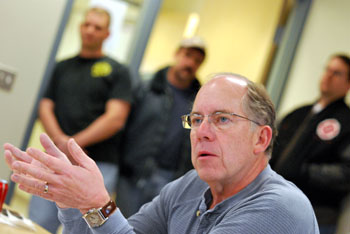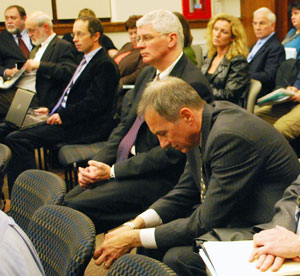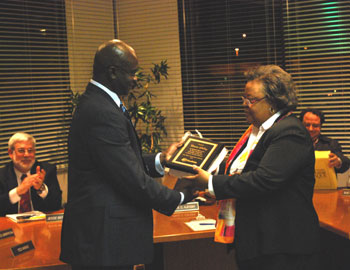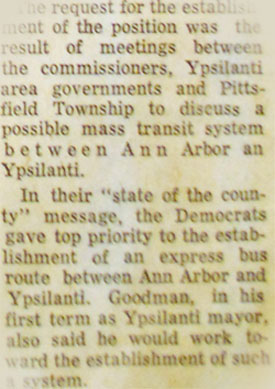Washtenaw County Board of Commissioners meeting (Oct. 20, 2010): A strong undercurrent of both the upcoming Nov. 2 elections and the looming county budget deficit erupted at times during Wednesday’s board meeting – the last board meeting prior to the elections.
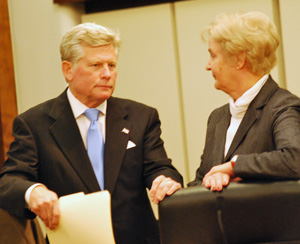
County commissioners Mark Ouimet and Leah Gunn talk prior to the start of the Oct. 20 Washtenaw County board of commissioners meeting. During the meeting Gunn, a Democrat, defended Ouimet, who has come under attack by some Democrats for excessive and inappropriate per-diem claims. (Photos by the writer.)
At the center of public commentary and commissioner discussion – which at times grew heated – was the issue of whether commissioners are appropriately claiming reimbursements for mileage and per diem. The controversy first emerged at the board’s last meeting on Oct. 6, when Democrat Tom Wieder spoke during public commentary to call for an investigation into per diem spending by commissioner Mark Ouimet. That same Oct. 6 meeting included discussion of a projected two-year budget deficit for 2012 and 2013 that could exceed $20 million.
Ouimet, a Republican who’s running for state representative in District 52 against Democrat Christine Green, was defended on Wednesday during public commentary by the county’s top two GOP officials, Mark Boonstra and Wyckham Seelig, who accused the Democratic board majority of partisan politics. They said they’ve launched their own investigation into commissioner spending, specifically citing out-of-state travel by Kristin Judge. Judge has been a vocal critic of Ouimet’s spending, during the meeting noting that the board rules are clear and that Ouimet failed to abide by them at times.
Ouimet was also defended at Wednesday’s meeting by several Democrats who serve with him on the board and who said they had nothing to do with the recent criticism of him. Leah Gunn recalled that Ouimet had been her Ward 4 Ann Arbor city councilmember some 20 years ago, and that she’s always found him to be upstanding and gracious. Ken Schwartz criticized the “Lansing politics” that were being brought to the county. He noted that the board has a track record of working together without divisive partisan politics, and that they’d all been surprised by the recent controversy.
County clerk Larry Kestenbaum also weighed in, commenting on a report that his office had released earlier in the day that analyzed per-diem and mileage expenses for all commissioners, dating back to 2005. Ouimet claimed the most expenses by far during that period – $32,804. Of Ouimet’s claims, $10,564 was analyzed as ineligible, and another $6,055 was “uncertain,” indicating a gray area where reimbursement rules aren’t clear. That means that about half of Ouimet’s claims don’t fall into the clearly acceptable category. Kestenbaum spoke during public commentary, saying that he considered all the commissioners to be his friends and great public servants – the report was not intended to be an attack, he said.
Ouimet offered to put the disputed amount in escrow until all of the claims have been reviewed. [The Chronicle converted the county clerk's Excel workbook with multiple tabs, one for each commissioner, to a single .pdf file. Commissioner Ronnie Peterson has not claimed mileage and per-diem expenses, and is not included in the report.]
The issue of commissioner expenses came up earlier in the meeting in another context. Judge introduced a resolution that would have eliminated retirement pensions and health care for commissioners, saying that the change would save the county more than $25,000 annually. She noted that she had circulated the resolution to commissioners prior to the meeting, though it was not on the agenda. No one seconded the motion, and it died without further discussion.
Also related to budget issues, the board gave initial approval to levy an economic development tax of 0.043 mills. Known as the Act 88 millage, it is expected to generate roughly $611,266 annually and would cost homeowners $4.30 for every $100,000 of a home’s taxable value. Because Act 88 predates the state’s Headlee Amendment, it can be approved by the board without a voter referendum. Three commissioners – Judge, Ouimet and Wes Prater – voted against the measure, and Jessica Ping abstained, citing the fact that a recipient of the funds, Ann Arbor SPARK, is a client of hers.
Another millage – one that, unlike Act 88, will be on the ballot – would support the Ypsilanti District Library. Linda Gurka, a member of the library’s board of trustees, spoke during public commentary to drum up support for the millage increase that will be on the ballot for Ypsilanti District Library voters. Also during public commentary, Todd Clark, co-chair of this year’s United Way of Washtenaw County‘s fundraising campaign, spoke in support of a proposed coordinated funding model for local nonprofits. [Full Story]




